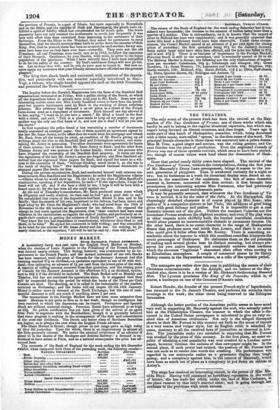THE THEATRES.
The only event of the present week has been the revival at the Hay- market of The Two Gentlemen of Verona; one of those works which can hardly be said to belong to the regular theatrical rdpertoire, but which ma- 'lagers bring forward on distant occasions, and then forget. Years ago it made part of that batch of Shaksperian comedies, which, being decorated with a little music, were called " operas," in the then sense of the word. The principal female character in those times was converted into a prima donna: Miss M. Tree, a good singer and actress, was the ruling genius; and Co- vent Garden was the place of production. Even the neglected Comedy of Errors was one of those operatic revivals, which seem to have been attract- ive; though of course voices were loud about the desecration of Shak- spere. Since that period nearly thirty years have elapsed. The revival of the Two Gentlemen of Verona, without the interpolations, during the first year of Mr. Macready's Drury Lane management, brings it nearer to the pre- sent generation of playgoers. Then it awakened curiosity for a night or two; but its feebleness as a work for theatrical display soon found an ex- ponent in the scantiness of the audiences. One fact of some dramatic interest is, however, connected with that revival; it first brought into prominence the interesting actress Miss Fortescue, who had previously played nothing but small melodramatic parts.
It may be generally assumed, that whenever the Two Gentlemen of Ve- rona is revived, it is for the sake of the Julia. At the Haymarket, this charmingly sketched character is of course played by Mrs. Kean; who Makes of it a companion-picture to her Viola; the additions of grief being given with great delicacy and pathos. But it is impossible to get a real dramatic interest out of the plot. Neither the constant Valentine nor the inconstant Protetia awakens the slightest emotion; and even if the play were in other respects more skilfully built, the hurried inartificial conclusion would alone present an insurmountable obstacle to permanent success. On the other hand, there is no comic character in the range of Shaksperian drama that produces more real mirth than Launce, and there is no actor who could give it fuller effect than Mr. Keeley. There is something re- markable about the manner in which this excellent comedian interprets the comic personages of Shakspere. He elaborates them on the old principle of making each several phrase bear its distinct meaning, but always pre- serves his own native humour, and completely eschews that hardness which the cleverest " legitimist " characters often affect when moving in an Elizabethan atmosphere. A couple of concerted pieces by Sir Henry Bishop remain in the Haymarket version, as a relic of the operatic period..


























 Previous page
Previous page